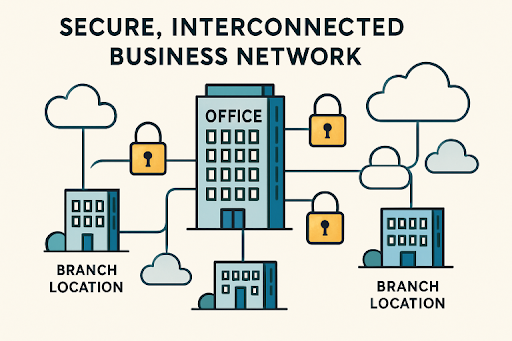Table of Contents
- Overview on Managed Network Services
- Understanding Managed Network Services
- Key Benefits of MNS
- Market Growth and Trends
- Role of AI and Automation
- Security Enhancements Through MNS
- Choosing the Right MNS Provider
- Future Outlook
Overview of Managed Network Services
Modern businesses increasingly recognize the imperative of robust and reliable network infrastructures. However, the complexity of managing enterprise networks, ensuring security, and supporting diverse connectivity needs can hinder operational agility. Many organizations address these challenges by partnering with expert providers such as MetTel. This approach enables them to access cutting-edge managed network services (MNS) designed to streamline network management and drive efficiency.
By outsourcing their network oversight needs, companies efficiently manage both traditional and cloud-based environments without straining internal resources. Leveraging a trusted partner in MNS gives enterprises the confidence that their networks are maintained, monitored, and optimized using the latest best practices and technologies.
Organizations that invest in MNS unlock vital benefits such as enhanced security, scalability, and expert support. As digital operations expand and new vulnerabilities emerge, relying on specialized managed service providers ensures business continuity, regulatory compliance, and operational excellence.
Increasingly, decision-makers are turning to managed network service partners for greater reliability, seamless connectivity, and proactive network monitoring. This trend is supported by a surge in demand for solutions capable of handling the evolving requirements of distributed teams, IoT deployments, and hybrid work environments. To know more about managed network service, visit https://www.mettel.net/solution-category/managed-network-services/.
Understanding Managed Network Services
Managed Network Services involve outsourcing the operational responsibility for a business’s network—including its architecture, monitoring, maintenance, and security—to a third-party specialist. Providers deliver a spectrum of solutions ranging from managed LAN and WAN, Wi-Fi, and VPNs to advanced network security and compliance offerings. With professional oversight, businesses ensure continuous network optimization and resilience against potential threats or downtime.
Types of Managed Network Services
- LAN Management
- WAN Optimization
- Cloud Networking
- Managed Firewalls and Security Appliances
- 24/7 Network Monitoring and Support

These services collectively empower organizations to achieve stable, high-performance network environments without the costs and burdens of internal expansion.
Key Benefits of MNS
- Cost Efficiency: Reduces the need for recruiting, training, and retaining in-house networking staff, while also minimizing hardware and software investments.
- Access to Specialized Expertise: Connects organizations to certified network engineers and up-to-date technologies.
- Improved Security: Managed providers deploy layered security solutions and conduct regular compliance checks to guard against cyberattacks.
- Scalability: Rapidly adapts to business growth or changing technology needs across locations and platforms.
- Operational Focus: Frees internal teams to concentrate on mission-critical initiatives and innovation.
Importantly, managed network services can quickly scale up or adjust features as a business expands, integrates acquisitions, or pivots to new markets, ensuring digital readiness at every phase.
Market Growth and Trends
The managed network services sector is experiencing remarkable expansion. According to a MarketsandMarkets report, the global MNS market is forecasted to reach nearly $90 billion by 2028, up from $65.7 billion in 2023. This surge aligns with digital transformation efforts, the proliferation of remote and hybrid workforces, and widespread adoption of cloud-based applications.
Increasing network complexity, coupled with heightened cybersecurity risks, is propelling organizations to partner with specialized service providers for efficient and secure operations. This market dynamic is transforming MNS into a core pillar of modern enterprise IT strategies.
Role of AI and Automation
Artificial Intelligence (AI) and automation technologies are reshaping how MNS providers deliver value. Modern platforms use AI-driven analytics to identify anomalies, predict outages, and automate corrective measures before they impact end users. For example, partnerships like the one between Verizon Business and HCLTech showcase how automation tools streamline troubleshooting and reduce manual interventions, boosting uptime and reducing response times.
This evolution enables proactive monitoring, reduces operational risk, and enhances network reliability. Businesses thus benefit from smarter, self-healing networks tailored for future-proof operations.
Security Enhancements Through MNS
With ever more sophisticated threats, safeguarding networks is a priority for every organization. MNS providers deliver robust security frameworks, deploying multiple tools such as managed firewalls, advanced encryption, intrusion detection/prevention systems, and continuous vulnerability assessments. Regular security audits and rapid response play a critical role in defending against breaches and fostering regulatory compliance.
According to ITPro, 84% of businesses expect their managed service partners to oversee their cybersecurity needs—underscoring the importance of integrated security in all MNS engagements. Comprehensive security allows organizations to confidently navigate evolving threats and changing compliance requirements.
Choosing the Right MNS Provider
Selecting an MNS provider is a critical strategic decision. Organizations should assess each provider’s track record, the breadth of networks and technologies supported, the scalability of their solutions, and the reliability of their security posture. Integration capabilities (on-premises, cloud, and hybrid) and support for emerging technology (like AI-driven platforms) are also essential factors.
Considerations for Provider Selection
- Demonstrated industry expertise
- Adaptability to evolving network architectures
- Responsive, transparent, and knowledgeable support teams
- Comprehensive service level agreements (SLAs)
Interviewing current and past clients and requesting proof of performance are effective methods to validate a provider’s ability to deliver as promised.
Future Outlook
Managed Network Services are poised for sustained growth as digital transformation accelerates throughout all industries. The rise of hybrid and remote-first organizations, the adoption of 5G, and the ongoing expansion of IoT all point toward a need for agile, secure, and highly automated network management solutions. Providers offering innovative, AI-driven services will play an increasingly central role in supporting operational resilience and digital agility for businesses worldwide.
By entrusting network responsibilities to expert partners, organizations can focus on strategic growth, anticipate technology trends, and maintain a competitive edge in an ever-evolving economic landscape.



